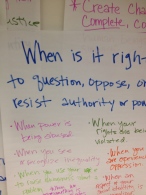When I started this blog, I was compelled by a feeling of urgency to catalog ways to keep doing work that matters for students in schools and reasons to hope that it would in fact matter. Since then brutal realities in the lives of our students of color have been revealed beyond the communities where it has been happening. The growing realization (where it was not recognized before) that citizens and police can officially and overtly get away with murder has taken us another step down some unknown road in this country.
With the latest Grand Jury decision not to indict a policeman who is shown on video with a chokehold on a man who then died, I am taking another look at my responsibility as a citizen and as an educator. The only person indicted in the Eric Garner killing was the man who recorded it on his phone.
How do we connect the education we provide to well-being, even safety, in this society? How do we talk to our students about what can be done, what they can do, what they need in order to do something in and for this world? Though I still argue our work in schools is part of the bigger struggle for equity, rights, justice, and opportunity, I wonder now how to push harder and further and faster.
In this chaotic time, I want to go back to my foundations. I want to re-read Paulo Freire’s Pedagogy of the Oppressed and We Make the Road by Walking: Conversations on Education and Social Change, a transcription of conversations between Freire and Myles Horton, (co-founder of the Highlander School). They provide guidance on organizing people, developing schools, curricula and instruction inspired by a deep and abiding faith and commitment. Those two are just the first on a long list that I now plan to revisit in the next few weeks.
I imagine myself walking down the hallways at school tomorrow. The halls may be quiet since many students are taking standardized tests (again).
When I work with teacher interns and their classroom teacher mentors tomorrow, I will document moments where content connects students to critical issues and thinking about their lives and the world. I will share what I see with teachers and hope for a conversation about how this helps kids navigate the world as it is right now. I will specifically look for information, skills, experience and reflection that support critical thinking and analysis followed by ideas for action.
I will ask teacher interns to identify opportunities they have provided for critical thinking, analysis or action—and what more they could do. I will find a few minutes with some of the teachers who carry this commitment for critical thinking at their core. We have to keep talking with each other about what is happening. We have to acknowledge this is the context in which we and our students live and in which we teach. We have to share our strength, support each other’s determination and come up with ideas to do more and better in our work.
It is a start—just a start. It’s time for me to recommit to my 365 days of posting about what is possible–now with even more urgent focus and drive.


Proud to have you as my neighbor.
Oh Milton
That means so much to me. I have appreciated staying connected with you and your thoughts.